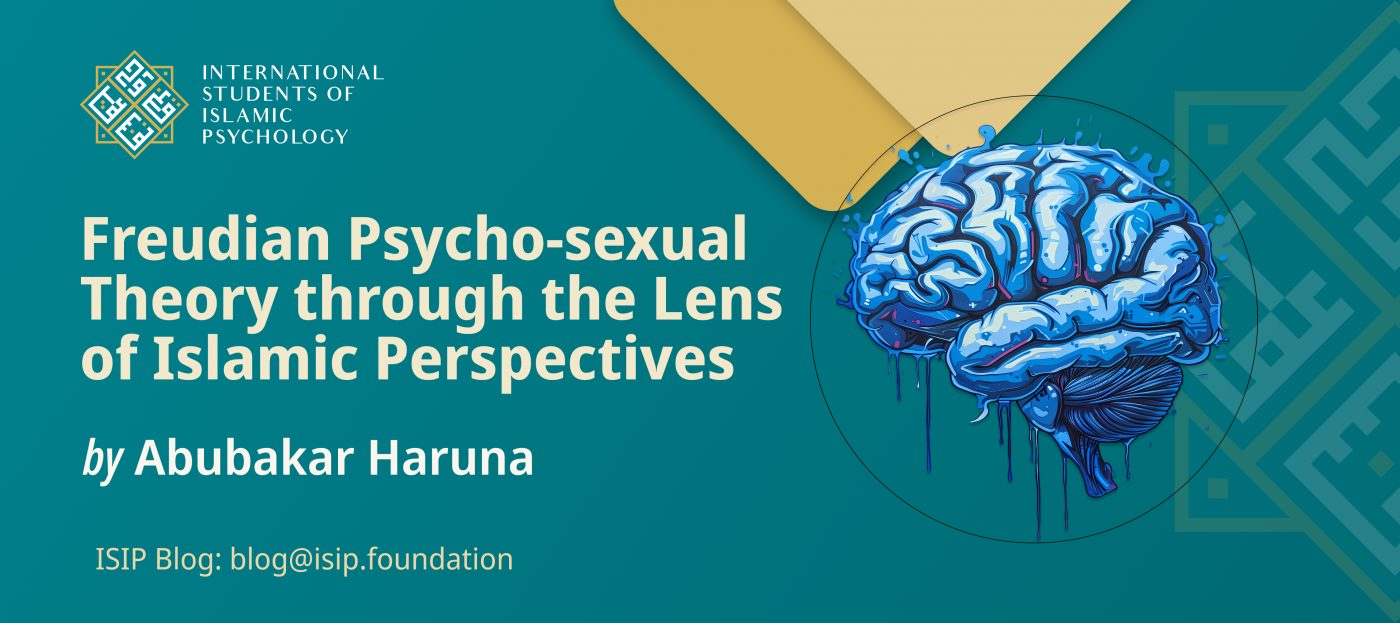
by Abubakar Haruna
Introduction
Psychosexual theory, originating from Sigmund Freud’s work, posits that human development is driven by sexual instincts. In Western psychology, Freud’s model delineates stages such as oral, anal, phallic, latency, and genital, with each stage marked by conflicts and resolutions. (Freud, 1905)
In Islamic psychology, while Freud’s theory may not be directly referenced, the concept of human development and the role of sexuality are discussed within the broader framework of Islamic teachings. Scholars like Ibn Sina (Avicenna) and Al-Ghazali emphasised the importance of understanding human nature, including sexual impulses, within the context of spiritual growth and moral development. (Sina, 11th century; Al-Ghazali, 11th century)
Both perspectives acknowledged the significance of understanding human sexuality in the context of psychological development, although they approach it from different philosophical and religious standpoints.
Freud’s Psychosexual Theory
Freud’s psychosexual theory posits that human development is driven by innate sexual instincts and desires. According to Freud (1908), individuals pass through five stages of psychosexual development: oral, anal, phallic, latency, and genital. Each stage is characterised by the focus of libido energy on different erogenous zones, and the successful resolution of conflicts at each stage is crucial for healthy psychological development.
In Freud’s psychosexual theory, the oral stage occurs during infancy, where the primary focus of pleasure is on the mouth. This is followed by the anal stage, during which the child gains pleasure from controlling bowel movements. The phallic stage, occurring around ages 3 to 6, is marked by the Oedipus or Electra complex, where children develop unconscious desires for the opposite-sex parent and rivalry with the same-sex parent. The latency stage, from age 6 to puberty, is a period of sexual dormancy, followed by the genital stage, where sexual urges re-emerge and are directed towards mature sexual relationships.
Psychosexual Theory Through the Lens of Islamic Perspectives
In Islamic thought, human development and sexuality are understood within the broader framework of religious teachings found in the Quran, Hadith (sayings of Prophet Muhammad), and interpretations of scholars throughout history. While there isn’t a specific psychosexual theory akin to Freud’s, various Islamic scholars have discussed human nature, including sexual impulses, within the context of spiritual growth and moral development.
One prominent Islamic scholar, Ibn Sina (Avicenna), discussed human psychology and the integration of physical and spiritual aspects of human nature in works such as “The Book of Healing” and “The Canon of Medicine.” He emphasised the importance of understanding human desires and impulses within the broader context of achieving balance and harmony in life.
Another influential figure, Al-Ghazali, addressed the topic of human desires and impulses in his works such as “The Revival of the Religious Sciences.” Al-Ghazali stressed the significance of self-awareness and self-control in managing human instincts, including sexual desires, to pursue spiritual growth and moral excellence.
Islamic teachings from the Quran and Hadith also provide guidance on sexuality, emphasising the importance of modesty, chastity, and marital relationships. Verses in the Quran such as Surah An-Nur (24:30-31) and Surah Al-Mu’minun (23:5-7) promote principles of modesty and self-restraint in interactions between genders.
Conclusion:
While there may not be a unified psychosexual theory in Islamic thought, the Quran, Hadith, and interpretations of scholars provide a comprehensive framework for understanding human nature and sexuality within the context of spiritual and moral development.
References
Al-Ghazali. “The Revival of the Religious Sciences.”
Freud, S. (1905). Three Essays on the Theory of Sexuality. Standard Edition, 7:123-243.
Freud, S. (1908). On the Sexual Theories of Children. Standard Edition, 9:205-226.
Hadith collections such as Sahih Bukhari and Sahih Muslim.
Ibn Sina (Avicenna). “The Book of Healing.”
Ibn Sina (Avicenna). “The Canon of Medicine.”
The Quran Surah An-Nur (24:30-31) and Surah Al-Mu’minun (23:5-7)

Abubakar Haruna you have done justice for Freudian psychosexual theory in strengthen it with Islamic perspectives may Almighty Allah bless you and increase your knowledge.
Thanks for reading and comment. May Almighty Allah bless you
Why did you not include later developments on Eros and libido as life force? The theories referenced are really early, Beyond the Pleasure Principle for example. Freud is interesting IMO but so limited.
Thanks for highlighting and reading. I wanted to write seperate on death and sex instincts later
There is no Islamic perspective on different stages of psychological development of human in comparison to freud’s or any other modern theory. We have different Quranic verses, prophetic historical references here and there but there is no well formed theory. I don’t even understand what’s the point of this article. It’s like comparing apple and oranges.
I made a generalised work, by telling what is in the Qur’an and other sources of Shariah. In a writing like this, one will expect comparison since the initial theory was developed by non Muslim. But will try to improve next time. Thanks for the comments and constructive criticism
This is good to look at for Muslims in this profession. There’s nothing wrong with looking at theories which are often discussed as the bedrock of the discipline and making comparisons to concepts and ideas discussed in our traditions. It’s quite interesting and we can come to necessary conclusions about human nature within the light of our guiding principals and compare them to big names like Freud. Keep doing what you’re doing. Such explorations are important.
I think you have explained Freud’s earlier psychosocial theory really well. While the write- up is not necessarily true to the title, what is useful is for us as muslim therapists who use a psychoanalytic framework/ paradigm to use this perspective to explain/ psychoeducate the client from an Islamic psychological perspective I.t.o how the quran and hadith guides when it comes to managing sexual urges, unconscious desires and conflicts etc.